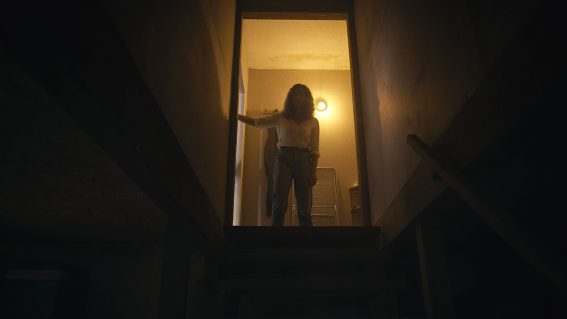
Revenge is both shatteringly brutal and gruesomely tedious in Violation

A new horror movie streaming on Shudder finds a fresh way to tell a story told so many times before, writes Katie Parker.
CW: references sexual assault and rape
Love it or loathe it—and it seems safe to say more people loathe it than love it—the rape-revenge genre is nevertheless one of cinema’s most enduring. Violation, the debut feature from directors, writers, and producers Madeleine Sims-Fewer and Dusty Mancinelli, is a shocking and provocative addition to the canon, not only for its harrowing subject matter and searingly explicit images, but for the way it takes this genre and turns it inside out—succeeding, where so many others have failed, in finding a new way to tell a story that has already been told so many times before.
See also:
* All new streaming movies & series
* The 25 best horror movies on Netflix Australia
Violation centres on Sims-Fewer as Miriam, a young woman going with her husband Caleb (Obi Abili) to visit her sister Greta (Anna Maguire), and Greta’s husband Dylan (Jesse LaVercombe). A tense dynamic plays out: beneath Miriam and Greta’s cheerful reminiscing is a palpable antipathy, while Caleb and Miriam are barely speaking. Miriam and Dylan, however, who were childhood friends, are familiar and vaguely flirty—their banter only occasionally disrupted by a sense of competitiveness for control over Greta.
Of course, as the title suggests, the horrible visit gets even worse and Miriam is devastatingly betrayed—first by Dylan, then by Greta. Pivoting on this horrific moment, the film flashes forward to the present. Time has passed, and Miriam is back at Greta and Dylan’s for another visit—but this time she has plans for Dylan.
Seesawing queasily back and forth between the dreamy, warped nightmare of the past, and the harsh, grisly hyper-reality of the present, Sims-Fewer and Mancinelli’s film is remarkable and absolutely brutal—though not in the ways you might expect.
While traditionally rape-revenge films have always been notorious for the length and explicitness of the inciting act (think Irréversible’s infamous 10 minute-long unbroken shot), Violation demands endurance instead for the aftermath.
These sequences, in which Miriam undertakes the extraordinarily grisly task of enacting her scheme, are shatteringly brutal and gruesomely tedious in their matter-of-fact depiction of the practicalities of revenge. These scenes are also significantly more harrowing and horrific than the film’s depiction of the assault—at least in terms of explicit violence. Miriam herself can barely stomach it, and one of the film’s most excruciating scenes sees Sims-Fewer vomiting repeatedly (and unsimulated), for more than a minute straight.
Joining a recent spate of rape-revenge movies, such as Revenge (2017), The Perfection (2019) and, most recently, Promising Young Woman (2020), these films seem to have sprung up in the wake of the #MeToo movement—each purporting to turn the genre on its head, and take the exploitation out of the exploitation film.
Sign up for Flicks updates
But where these films ultimately bestow catharsis and empowerment on their victorious survivors, Violation refuses to play the game. Instead, Sims-Fewer and Mancinelli interrogate why Miriam is actually doing what she’s doing, who she’s really trying to hurt, and whether it will achieve even a modicum of catharsis—or, for that matter, justice. More than the sum of its horrifying images, it is this ambiguity that makes Violation such a chilling, disquieting film. Is Miriam a heroine or a monster?
If it’s not already clear, Violation will not be for everyone, and even fans of the genre may find it challenging in its refusal to affirm Miriam’s righteousness one way or another. Yet, for this very same reason, it is a triumph and an incredibly promising debut for its filmmakers. Featuring an incredible, viscerally effective performance from Sims-Fewer, and a very, very brave one from LaVercombe, who is extraordinary in a totally thankless part, Violation is a remarkable film and a gamechanger for a genre that has long struggled to reinvent its formula. See it if you dare—just don’t go in on a full stomach.














